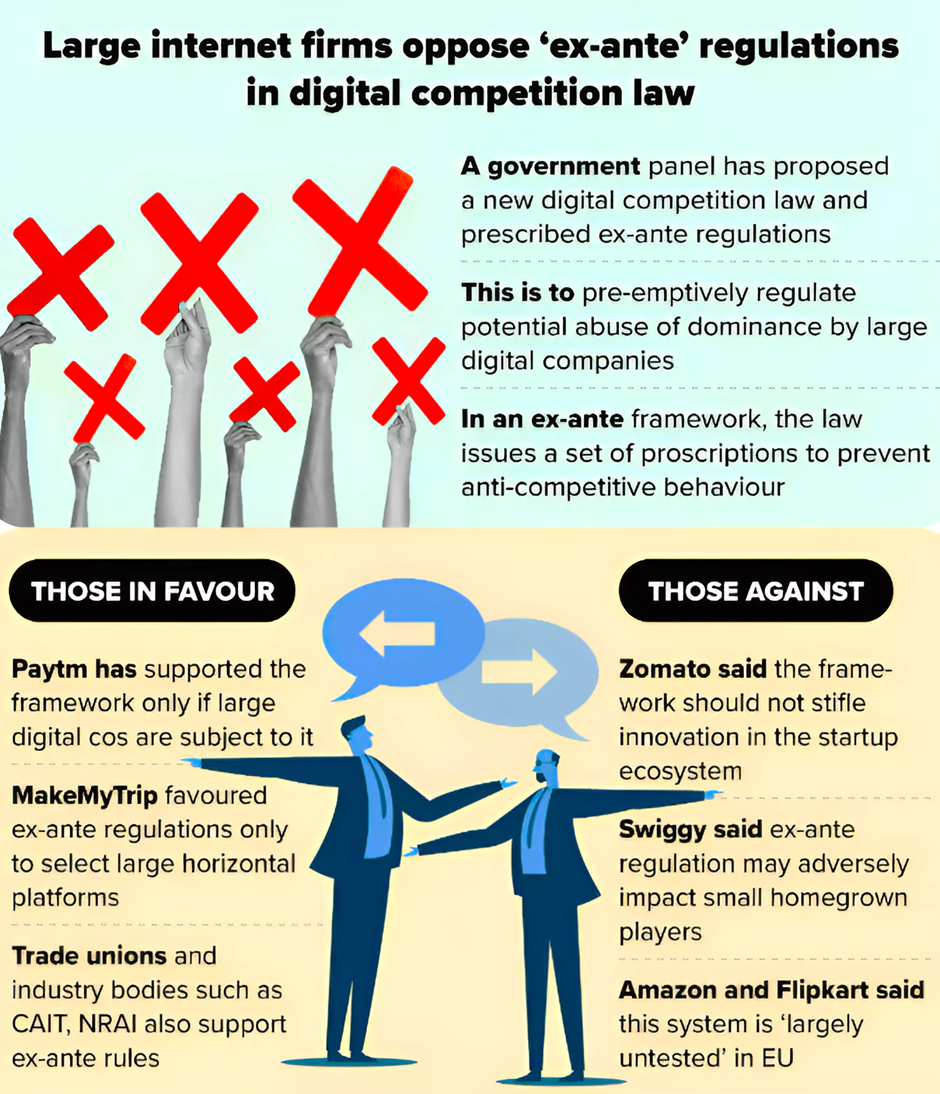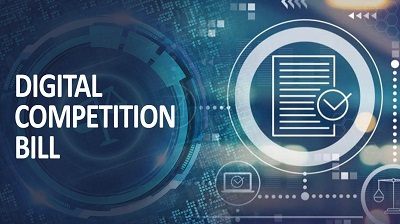Context:
In February 2023, the Ministry of Corporate Affairs (MCA) constituted a Committee on Digital Competition Law (CDCL) to examine the need for a separate law on competition in digital markets.
Ex-Ante vs. Ex-Post Frameworks: Predictive Regulations
What is an Ex-Post Framework?
The Competition Act, 2002, serves as India's primary legislation to prevent practices that harm competition. It establishes the Competition Commission of India (CCI) as the national regulator. This Act is based on an ex-post framework, meaning the CCI can only act after anti-competitive conduct has occurred.
What is an Ex-Ante Framework?
In contrast, an ex-ante competition regulation empowers the CCI to pre-empt and prevent anti-competitive behaviour before it occurs. This proactive approach is crucial for digital markets where enterprises can grow rapidly due to economies of scale, economies of scope, and network effects. These factors can lead to markets tipping irreversibly in favour of incumbents, making timely intervention essential.
Why an Ex-Ante Framework?
The European Union (EU) is currently the only jurisdiction with a comprehensive ex-ante competition framework under the Digital Markets Act. The CDCL supports this approach for digital markets due to their unique characteristics. Digital enterprises benefit from reduced production costs with increased units (economies of scale) and lower total production costs with more services (economies of scope).
This rapid growth, coupled with network effects where service utility increases with user numbers, can quickly entrenched incumbents in the market. Consequently, the CDCL advocates for proactive measures to supplement the existing enforcement framework, given the limitations of the ex-post approach in addressing these dynamics effectively.
What is the Draft’s Basic Framework?
Significant Entities
- Targeting Dominant Digital Enterprises: The draft Bill, modelled after the EU's Digital Markets Act, aims to regulate dominant digital enterprises rather than all digital entities. It identifies ten ‘core digital services’ such as online search engines, social networking services, and video-sharing platforms. Dominance is determined using two tests:
- Significant Financial Strength: Assessed through financial parameters.
- Significant Spread: Based on the number of users in India.
- Significant Financial Strength: Assessed through financial parameters.
Even if an enterprise does not meet these quantitative standards, the CCI can designate it as a “systemically significant digital enterprise (SSDE)” based on qualitative standards.
- Obligations of SSDEs: SSDEs must operate fairly, non-discriminately, and transparently with their users. The draft Bill prohibits several anti-competitive practices, including:
- Self-Preferencing: Favoring own products over third-party products on the platform.
- Restricting Third-Party Applications: Limiting the availability of third-party apps and preventing users from changing default settings.
- Anti-Steering: Restricting business users from directly communicating with their end users.
- Tying and Bundling: Bundling non-essential services with the primary service.
- Data Cross-Utilization: Using data collected from one service to benefit another service unfairly.
- Non-Public Data Usage: Using non-public data to give an unfair advantage to their own services.
- Self-Preferencing: Favoring own products over third-party products on the platform.
Designation of Associate Digital Enterprises (ADEs)
Understanding the role that data collected by one company within a major technology group can play in benefiting other group companies, the Bill proposes to designate associate digital enterprises (ADEs). If an entity within a group is determined to be an ADE, it would have the same obligations as SSDEs, depending on its involvement with the core digital service offered by the main company.
For instance, Google Maps could theoretically be deemed an ADE due to its data-sharing relationship with Google Search, and similarly, YouTube could be considered based on the level of data sharing and recommendations it provides.

Reactions to the Draft Bill
Skepticism and Opposition
The draft Bill has faced significant opposition due to doubts about the ex-ante regulation model's effectiveness. Critics argue it is unsuitable for India and lacks evidence of success in the EU. Concerns include potential negative impacts on investments in Indian start-ups, which might avoid scaling up to evade stringent regulations. Additionally, restrictions on tying, bundling, and data usage could harm MSMEs that rely on big tech to reduce operational costs and enhance customer outreach.
Support from Indian Start-Ups
Despite widespread skepticism, some Indian start-ups support the draft Bill, believing it could curb monopolistic practices by big tech companies. However, they call for a revision of the financial and user-based thresholds to ensure that domestic start-ups are not unduly burdened.
Other Criticism of the Draft Bill
- Opposition from Big Tech and Industry Bodies: The draft Bill faces resistance from big tech companies, industry bodies funded by tech companies, and consultancies aiming to gain tech clients. Critics argue that the ex-ante framework's strict norms could burden compliance, detracting from innovation and research.
- Concerns Over Stringent Requirements: Tech giants worry about the draft Bill's stringent requirements. For instance, the EU’s DMA led to a 4,000% increase in time to find information via Google search. The Bill might also force companies like Apple to allow third-party app downloads, which Apple opposes. Google is concerned about security risks from sideloading apps.
- Broad Definition of Significant Platforms: The draft law's broad definition of significant platforms, unlike the EU’s DMA, leaves designations to the CCI's discretion. Companies fear this could lead to arbitrary decisions, affecting start-ups and smaller businesses that rely on big platforms for audience reach.
The Need to Foster Digital Competition
- Addressing Anti-Competitive Practices Government officials argue that big tech companies have a history of anti-competitive practices, best addressed by a presumptive framework. In 2022, Google was fined ₹1,337 crore by the CCI for anti-competitive conduct in the Android ecosystem. Officials believe that high market barriers allow a few major US-based tech companies to dominate innovation, making it difficult for new entrants and rivals to compete.
- Impact on Smaller Companies and Niche Products Smaller companies benefit from lower advertising rates on platforms like Google and Facebook, but this has led to a surveillance-driven digital advertising industry. While niche products like Signal and DuckDuckGo offer alternatives, they remain niche due to their specific features. The draft Bill aims to foster competition while addressing the practices of big tech companies.
Conclusion
The draft Digital Competition Bill marks a significant shift in how India approaches competition regulation in digital markets. By adopting an ex-ante framework, it aims to proactively prevent anti-competitive practices, ensuring a fair and competitive digital ecosystem. However, the skepticism surrounding its implementation highlights the need for careful consideration and possible revisions to ensure it addresses India's unique market dynamics effectively. Balancing regulation with the need to foster innovation and investment will be crucial for its success.
|
Probable Questions for UPSC Mains
|
Source: The Hindu







